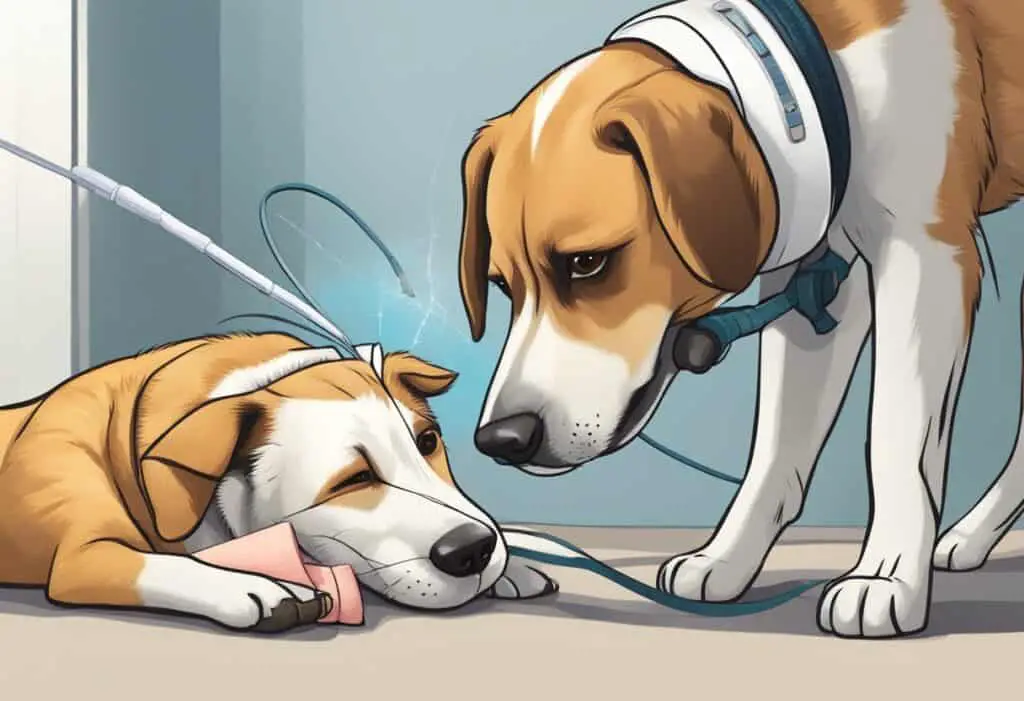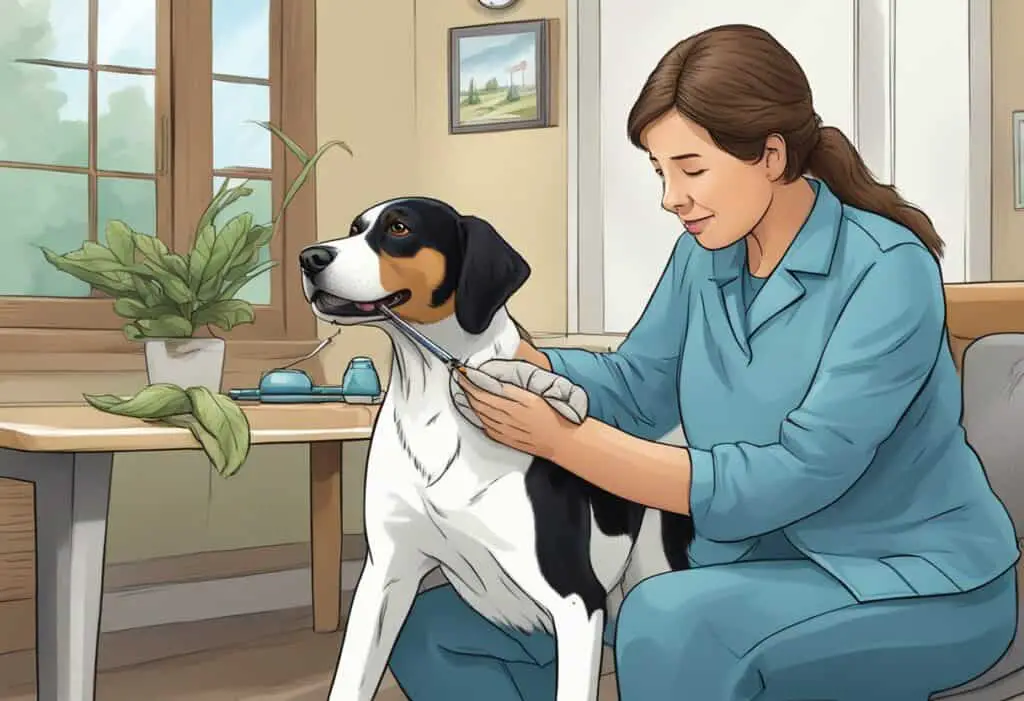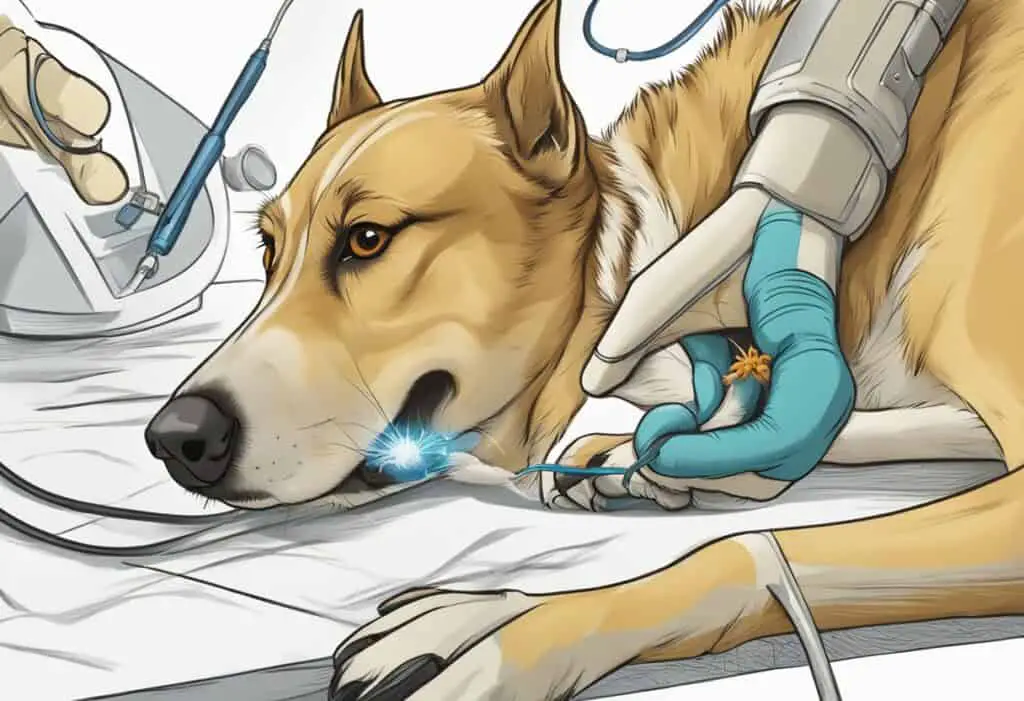As dog owners, we want to ensure our furry friends are healthy and happy. Unfortunately, accidents happen, and our pets can suffer from various injuries and illnesses, including spider bites. With over 3,000 species of spiders in the U.S., including venomous ones like the brown recluse, it’s essential to know how to identify and treat spider bites on dogs.

Identifying a spider bite on a dog can be challenging, as dogs can’t communicate their symptoms like humans can. However, some signs may indicate a spider bite, such as redness, swelling, and pain around the bite area. If you notice any of these symptoms, it’s crucial to seek immediate veterinary care to prevent further complications.
Understanding venomous spiders and their behavior can also help prevent spider bites on dogs. Spiders typically bite when they feel threatened or agitated, so avoiding their habitats, such as woodpiles or tall grass, can reduce the risk of bites. Additionally, keeping your yard and home clean and clutter-free can prevent spiders from making a home on your property.
Identifying a Spider Bite on a Dog

As a dog owner, it’s important to know how to identify a spider bite on your furry friend. With over 3,000 types of spiders in the U.S. alone, it’s important to be aware of the potential dangers. In this section, I’ll cover how to recognize spider webs and spiders, as well as the symptoms of a spider bite.
Recognizing Spider Webs and Spiders
One of the first things to look for when identifying a spider bite on your dog is the presence of spider webs or spiders in the area where your dog was bitten. Spiders are most active during the warmer months, so it’s important to be extra vigilant during this time.
If you notice spider webs or spiders in your home or yard, take steps to remove them. This can help reduce the risk of your dog being bitten.
Spotting the Symptoms of a Spider Bite
The symptoms of a spider bite on a dog can vary depending on the species of spider. However, some common symptoms include:
- A red bump or lesion at the site of the bite
- Swelling or redness in the affected area
- Pain or discomfort
- Itching or irritation
- Blisters
- Tissue damage
If you notice any of these symptoms, it’s important to seek veterinary care for your dog. Some spider bites, such as those from the black widow or brown recluse spider, can be very serious and require immediate medical attention.
In addition to the above symptoms, some spider bites may also cause systemic symptoms such as vomiting, diarrhea, and muscle tremors. If you notice any of these symptoms, seek veterinary care right away.
Remember, prevention is key when it comes to spider bites on dogs. Keep your home and yard free of spider webs and take steps to protect your dog from potential bites. If you do suspect your dog has been bitten, seek veterinary care right away to ensure the best possible outcome.
Understanding Venomous Spiders

As a dog owner, it’s important to be aware of the dangers of venomous spiders. In the United States, the most common venomous spiders that can harm dogs are the brown recluse spider and the black widow spider. Other venomous spiders, such as the Chilean recluse and the red widow, are less common but still pose a threat.
The Brown Recluse Spider
The brown recluse spider is identified by its violin-shaped pattern on its body. These spiders are mostly active at night and like to hide in bedding, closets, attics, and dry basements. Brown recluse spider bites can cause a range of symptoms, including fever, chills, and muscle pain. In some cases, the bite can cause a necrotic wound that can take several weeks to heal.
The Black Widow Spider
The female black widow spider is the most recognizable venomous spider, identified by its round, shiny black body and red hourglass marking on its abdomen. Black widow spider bites are considered a medical emergency for dogs and can cause symptoms such as muscle pain, cramps, and seizures. In severe cases, the bite can be fatal.
Other Venomous Spiders
While the brown recluse and black widow spiders are the most common venomous spiders that can harm dogs, it’s important to be aware of other venomous spiders as well. The Chilean recluse and red widow are two examples of venomous spiders that can cause harm to dogs. It’s important to seek veterinary care immediately if you suspect your dog has been bitten by a venomous spider.
Knowing how to identify venomous spiders and their bites is crucial for dog owners. If you suspect your dog has been bitten by a venomous spider, seek veterinary care immediately.
Serious Symptoms and Complications

If your dog has been bitten by a spider, it is important to know that some spider bites can cause serious symptoms and complications. While most spider bites are not life-threatening, some can cause neurological effects and physical reactions that require immediate veterinary attention.
Neurological Effects
Some spider bites can cause neurological effects in dogs. These effects can include tremors, paralysis, cramping, seizures, weakness, muscle pain, agitation, rigidity, spasms, and drooling. If your dog is experiencing any of these symptoms, it is important to seek veterinary care immediately.
Physical Reactions
Spider bites can also cause physical reactions in dogs. These reactions can include fever, lethargy, difficulty breathing, anemia, clotting abnormalities, nausea, vomiting, diarrhea, and rigidity. If your dog is experiencing any of these symptoms, it is important to seek veterinary care immediately.
It is important to note that some spider bites can cause serious complications, such as anaphylactic shock. If your dog is experiencing any symptoms that are not normal for them, it is important to seek veterinary care immediately.
When you take your dog to the veterinarian, they will likely perform a physical examination and may recommend blood tests or imaging to determine the severity of the bite. Treatment may include medications to manage symptoms, such as pain and inflammation, and supportive care, such as fluids and oxygen therapy.
In summary, spider bites on dogs can cause serious symptoms and complications. If your dog is experiencing any abnormal symptoms, it is important to seek veterinary care immediately.
Immediate and Supportive Care for Spider Bites

As a dog owner, it is important to know what to do if your furry friend gets bitten by a spider. Spider bites can cause pain, swelling, and discomfort in dogs, and in some cases, can even lead to an allergic reaction. In this section, I will outline the immediate and supportive care measures you can take to help your dog after a spider bite.
First Aid Measures
The first thing you should do if you suspect your dog has been bitten by a spider is to clean the area using plain soap and water. This will help to prevent infection and remove any venom that may be present. You can then apply a cold compress or ice pack to the bite area to help reduce swelling and pain. Be sure to wrap the compress or ice pack in a towel to prevent frostbite.
If your dog is experiencing discomfort, you can give them pain medications such as acetaminophen or ibuprofen, but only under the guidance of a veterinarian. Never give your dog medication without consulting a vet first, as some medications can be toxic to dogs.
Veterinary Treatment
If your dog is showing signs of an allergic reaction, such as difficulty breathing or swelling of the face or muzzle, seek emergency veterinary care immediately. Your vet may administer antihistamines, muscle relaxers, or even IV fluids to help manage the symptoms.
In some cases, your vet may also administer antivenom or antivenin to counteract the effects of the spider bite. These treatments can be expensive, so it is important to have pet insurance or be prepared to pay out of pocket.
In addition to medical treatment, your vet may also recommend supportive care measures such as keeping your dog calm and comfortable, and monitoring them closely for any changes in their condition.
By following these immediate and supportive care measures, you can help your dog recover from a spider bite and ensure their overall health and wellbeing. Remember to always consult with a veterinarian if you have any concerns about your dog’s health.
Prevention and Control Measures

As a pet parent, it is essential to take steps to prevent and control spider bites on your furry friend. Here are some measures that you can take to protect your dog from spider bites:
- Keep your yard and home free of spiders: Regularly clean your home and yard to remove spider webs, eggs, and spiders. Consider using pest control measures to keep spiders away from your home and yard.
- Keep your dog’s fur trimmed: Long fur can provide a good hiding place for spiders. Regular grooming and trimming your dog’s fur can help to reduce the risk of spider bites.
- Be cautious when walking your dog: Avoid walking your dog in areas with tall grass, bushes, or piles of leaves, where spiders may be hiding.
- Keep your dog indoors: If you live in the Midwest, where venomous spiders like the brown recluse and black widow are common, consider keeping your dog indoors during the night.
- Consult with your veterinarian: If your dog has a history of envenomation or allergic reactions to insect bites, consult with your veterinarian about preventative measures.
If your dog is bitten by a spider, it is important to seek veterinary care immediately. Non-venomous spider bites are generally harmless and will heal on their own, but venomous spider bites can be deadly and cause serious side effects such as kidney damage and nervous system damage.
To relieve the symptoms of a spider bite, you can apply a baking soda paste to the affected area to reduce itching and swelling. However, this should not be used as a substitute for veterinary care.
Remember, prevention is key when it comes to spider bites on dogs. By taking the necessary precautions, you can protect your furry friend from harm and ensure their safety.
Conclusion

In conclusion, spider bites on dogs can be a scary experience for pet owners. It is important to remain calm and take immediate action to ensure the safety and well-being of your furry friend. If you suspect that your dog has been bitten by a spider, it is recommended to seek veterinary attention right away.
While some spider bites may be harmless, others can be very dangerous and even life-threatening. The severity of the bite depends on many factors, such as the type of spider, the size of the spider, and the location of the bite. Therefore, it is crucial to identify the type of spider that has bitten your dog, if possible.
If you notice any symptoms of a spider bite on your dog, such as swelling, redness, or pain around the bite area, it is important to clean the area with plain soap and water and apply a cold compress or ice pack to reduce swelling. You may also consider applying a thick paste of baking soda and water or aloe vera gel to relieve itching.
Prevention is key when it comes to spider bites on dogs. To prevent spider bites, it is recommended to maintain regular pest control measures in and around your home. You can also keep your dog away from areas where spiders are likely to be found, such as woodpiles, sheds, and garages.
In summary, spider bites on dogs can be a serious matter, but with prompt action and proper treatment, your dog can make a full recovery. Always consult with your veterinarian if you suspect that your dog has been bitten by a spider. Remember, prevention is key, so take steps to keep your home and yard free of spiders to protect your furry friend.
Frequently Asked Questions

What are the symptoms of a spider bite on a dog?
Spider bites on dogs can cause a range of symptoms, including swelling, redness, pain, and itching at the site of the bite. In some cases, dogs may also experience vomiting, diarrhea, lethargy, and fever. It’s important to keep an eye out for these symptoms and seek veterinary care if your dog is exhibiting any of them.
How do you treat a spider bite on a dog?
The first step in treating a spider bite on a dog is to clean the affected area with warm water and mild soap. You can also apply a cold compress to help reduce swelling and pain. If your dog is experiencing discomfort, you may want to give them a pain reliever like acetaminophen or ibuprofen (but never give your dog aspirin). It’s important to monitor your dog closely and seek veterinary care if their symptoms worsen or don’t improve.
Can you use peroxide on a spider bite on a dog?
While hydrogen peroxide can be used to clean the area around a spider bite on a dog, it’s not recommended to apply it directly to the wound. This is because peroxide can damage healthy tissue and delay the healing process. Instead, use warm water and mild soap to clean the area around the bite.
What should you do if your dog is bitten by a brown recluse spider?
Brown recluse spider bites can be particularly dangerous for dogs, as they can cause severe tissue damage and even death in some cases. If you suspect that your dog has been bitten by a brown recluse spider, seek veterinary care immediately. Your vet may recommend antibiotics, pain relievers, and other treatments to help manage your dog’s symptoms.
Is it safe to give a dog Benadryl for a spider bite?
Benadryl can be used to help manage the symptoms of a spider bite on a dog, such as itching and swelling. However, it’s important to talk to your vet before giving your dog any medication, including over-the-counter drugs like Benadryl. Your vet can help you determine the appropriate dosage and ensure that there are no potential interactions with other medications your dog may be taking.
When should you take your dog to the vet for a spider bite?
If your dog is exhibiting any symptoms of a spider bite, such as swelling, redness, pain, or itching, it’s important to monitor them closely and seek veterinary care if their symptoms worsen or don’t improve. You should also seek veterinary care if your dog shows signs of an allergic reaction, such as difficulty breathing or swelling of the face or throat. Additionally, if you suspect that your dog has been bitten by a venomous spider like a brown recluse or black widow, seek veterinary care immediately.








